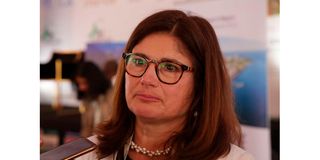Covid, Ukraine war hinder battle on climate change

European Union ambassador to Kenya Henriette Geiger addresses reporters during the ongoing Africities conference in Kisumu.
The international fight against climate change is being hampered by emerging challenges of the Covid-19 pandemic and the war between Russia and Ukraine.
This comes as the world prepares for the COP27 Climate Change conference to be held in Sharm el-Sheikh, Egypt.
European Union ambassador to Kenya Henriette Geiger said there is a decrease of interest in the global climate crisis due to the coronavirus pandemic.
“The global Covid-19 pandemic drew the attention from the climate change crisis, now we have other challenges such as the war in Europe,” Ms Geiger said during the Africities Summit session on climate action at Mamboleo ASK Grounds, Kisumu city, yesterday.
“All these things have been putting climate change as number two or three, which is extremely unfortunate.”
“I really hope the next session will re-dynamise our approach and put it where it belongs.”
However, there is hope with United States’ investment and zeal to fight climate change, the ambassador told the delegates.
“Now that the US is back to help with climate change fight, we can have a stronger global position. The previous meetings have not been very encouraging, they have fell short of expectations and ambition,” she added.
But there are a lot of initiatives from Sub-Sahara countries, despite the challenges of global warming, the summit was told.
Sub-Sahara is responsible for less than four per cent of the annual greenhouse gases emission.
However, the region is often described as the most at risk to the negative effects of climate change.
“Climate adaptation projects and building climate resilient infrastructure are essential for Africa to prevent further loss of livelihoods due to floods, cyclones and droughts,” Ms Geiger said.
Despite contributing less than four per cent of the greenhouse gases, Africa receives only three per cent of total climate finance, the EU ambassador said.
She called on climate change to be fought at local authorities and the community level.
“Increasing number of young people in Africa are aware of the challenge of climate change. We need creative ideas on how to deal with global warming. Not everything is costly,” she said.
Kisumu Governor Anyang Nyong’o said intermediary cities in Africa face many challenges in matters climate change – from planning, leadership, inadequate technical capacity, lack of innovation, financing and political will.
“Many cities struggle with ways of tackling climate change. Not only because of the expected change itself but because of the perceived lack of capacity of Africans and their governments to adapt to them,” Prof Nyong’o said.
The governor added that sustainable development goal number 13 urges leaders globally to take urgent action to combat climate change and its impacts.
“This requires mobilising resources. Mobilising resources requires the involvement of a multitude of actors and stakeholders from the public and private sectors to facilitate low-carbon, climate resilient development,” the governor said.





